-
 Bitcoin
Bitcoin $85,053.4987
0.47% -
 Ethereum
Ethereum $1,604.0688
1.50% -
 Tether USDt
Tether USDt $0.9997
-0.01% -
 XRP
XRP $2.0888
1.22% -
 BNB
BNB $593.1504
0.71% -
 Solana
Solana $138.4195
3.26% -
 USDC
USDC $0.9999
-0.01% -
 Dogecoin
Dogecoin $0.1597
3.11% -
 TRON
TRON $0.2415
-1.60% -
 Cardano
Cardano $0.6329
3.08% -
 UNUS SED LEO
UNUS SED LEO $9.2888
0.62% -
 Chainlink
Chainlink $12.7878
1.44% -
 Avalanche
Avalanche $19.2917
1.31% -
 Stellar
Stellar $0.2447
1.18% -
 Toncoin
Toncoin $3.0011
0.71% -
 Shiba Inu
Shiba Inu $0.0...01226
3.89% -
 Hedera
Hedera $0.1676
2.05% -
 Sui
Sui $2.1459
1.63% -
 Bitcoin Cash
Bitcoin Cash $337.7604
2.53% -
 Hyperliquid
Hyperliquid $17.6730
4.32% -
 Polkadot
Polkadot $3.7299
1.72% -
 Litecoin
Litecoin $76.5325
1.77% -
 Dai
Dai $0.9999
0.00% -
 Bitget Token
Bitget Token $4.4634
2.38% -
 Ethena USDe
Ethena USDe $0.9991
0.00% -
 Pi
Pi $0.6486
5.66% -
 Monero
Monero $212.3459
-1.60% -
 Uniswap
Uniswap $5.2591
1.62% -
 Pepe
Pepe $0.0...07316
3.79% -
 OKB
OKB $50.8354
2.04%
How does NFT Licensing stipulate the right to use NFTs?
NFT licenses grant specific usage rights, not ownership, and vary widely; understanding the license terms before acquiring or using an NFT is crucial for avoiding legal disputes.
Mar 07, 2025 at 05:01 am

Key Points:
- NFT licensing doesn't transfer ownership; it grants specific usage rights.
- Licenses can be highly customized, covering various aspects of NFT use.
- Legal clarity surrounding NFT licensing is still evolving.
- Understanding the license terms is crucial before acquiring or using an NFT.
- Choosing the right licensing model depends on the intended use and commercial goals.
How Does NFT Licensing Stipulate the Right to Use NFTs?
Non-Fungible Tokens (NFTs) represent unique digital assets, often artwork, collectibles, or in-game items. While you own the NFT itself, licensing dictates how you can use it. Unlike traditional copyright, which grants exclusive rights, NFT licenses can grant varying degrees of usage rights to the licensee, leaving the NFT owner with some degree of control. The specific rights granted depend entirely on the license terms outlined by the NFT creator or owner.
NFT licenses aren't standardized. They're often crafted individually, meaning each license agreement might differ significantly. This flexibility allows creators to precisely define how their NFTs can be used commercially or non-commercially. The license might grant the right to display the NFT, create derivatives, use it in a commercial project, or even sub-license the rights to others. This detailed control distinguishes NFT licensing from simpler copyright models.
The legal landscape surrounding NFT licensing is still emerging. While NFTs leverage blockchain technology for transparency and immutability, the interpretation of their usage rights is subject to ongoing legal development. This means that ambiguities might exist, highlighting the need for clear and comprehensive licensing agreements. Without carefully drafted licenses, disputes can easily arise regarding the scope of permitted uses.
Before acquiring or using an NFT, thoroughly examine the associated license. Understand the limitations on usage and reproduction. Commercial licenses might involve royalties paid to the NFT owner. Non-commercial licenses may restrict usage for profit-making purposes. Carefully consider these restrictions before committing to an NFT purchase or utilization.
Types of NFT Licenses and Their Implications:
NFT licenses can be categorized broadly, although specific terms vary greatly. Here are a few examples:
- Simple Display License: This grants the right to display the NFT on personal websites or social media, but usually prohibits commercial use or creation of derivative works.
- Commercial Use License: This license permits the use of the NFT for commercial purposes, such as including it in a marketing campaign or using it in a product. It often includes clauses regarding royalties or profit sharing.
- Derivative Works License: This allows the licensee to create derivative works based on the NFT, such as creating prints or animations based on the original artwork. This usually requires explicit permission and may involve royalty payments.
- Sub-Licensing License: This allows the licensee to grant further licenses to others, extending the use of the NFT to a wider audience. This often involves a tiered royalty structure.
- Exclusive License: This grants exclusive rights to the licensee, meaning no one else, including the NFT owner, can use the NFT in the specified manner. This is a significant transfer of rights, often for a specified period.
- Non-Exclusive License: This grants the licensee the right to use the NFT, but the NFT owner retains the right to grant licenses to others. This is the most common type of license.
Navigating the Legal Landscape:
The legal implications of NFT licensing are complex and continue to evolve. Several critical aspects require careful consideration:
- Jurisdiction: The governing law for an NFT license is often determined by the location of the NFT owner or the place of contract.
- Enforcement: Enforcing NFT license agreements can be challenging, as the decentralized nature of blockchain can make it difficult to track usage and identify infringements.
- Intellectual Property Rights: NFT licensing doesn't automatically transfer underlying intellectual property rights. Separate agreements may be needed to cover copyright, trademark, or other IP aspects.
- Ambiguity: Vague or poorly drafted licenses can lead to disputes. Clear, unambiguous language is essential to avoid conflicts.
- Smart Contracts: Smart contracts can automate some aspects of NFT licensing, such as royalty payments, but they don't eliminate the need for clear legal agreements.
Step-by-Step Guide to Understanding an NFT License:
Before engaging with an NFT and its license, follow these steps:
- Read the Entire License Agreement: Don't skip any clauses, even if they seem technical.
- Identify Key Terms: Pay close attention to terms like "commercial use," "derivative works," "royalties," and "exclusive rights."
- Understand Limitations: Note any restrictions on usage, reproduction, or distribution.
- Clarify Ambiguities: If anything is unclear, seek legal advice before proceeding.
- Review Royalty Structures: Understand how royalties are calculated and paid, if applicable.
Common Questions:
Q: Does owning an NFT give me full rights to its use?
A: No. Owning an NFT grants ownership of the token itself, but the rights to use the underlying asset are determined by the associated license agreement.
Q: Can I sell an NFT I only have a license for?
A: Generally no, unless the license explicitly grants you resale rights. You only own the license, not the NFT itself.
Q: What happens if someone violates my NFT license?
A: Legal action might be possible, but enforcement can be challenging depending on the jurisdiction and the specific terms of the license.
Q: Are NFT licenses legally binding?
A: Yes, if properly drafted and executed, NFT licenses are legally binding contracts. However, enforcement can present challenges.
Q: Can I create derivative works from an NFT without permission?
A: No, unless the license specifically grants you the right to create derivative works. Doing so without permission is a breach of contract.
Disclaimer:info@kdj.com
The information provided is not trading advice. kdj.com does not assume any responsibility for any investments made based on the information provided in this article. Cryptocurrencies are highly volatile and it is highly recommended that you invest with caution after thorough research!
If you believe that the content used on this website infringes your copyright, please contact us immediately (info@kdj.com) and we will delete it promptly.
- Ripple's XRP price has held on well despite recent market volatility
- 2025-04-19 13:20:13
- With a SHIB burn of nearly 28 billion tokens in a day
- 2025-04-19 13:20:13
- Bitcoin's value has transformed dramatically since its creation, rising from $0.08 in 2010 to an all-time high of $69,000 in 2021.
- 2025-04-19 13:15:13
- Ethereum Whales Have Been Accumulating ETH at a Stash Rate, Pointing to an Impending Price Rally
- 2025-04-19 13:15:13
- This weekend's best sweepstakes casino promos include our favorite providers
- 2025-04-19 13:10:13
- A volatile trading session looms as $2.02 billion in Bitcoin [BTC] options and $280 million in Ethereum [ETH] options are set to expire today.
- 2025-04-19 13:10:13
Related knowledge
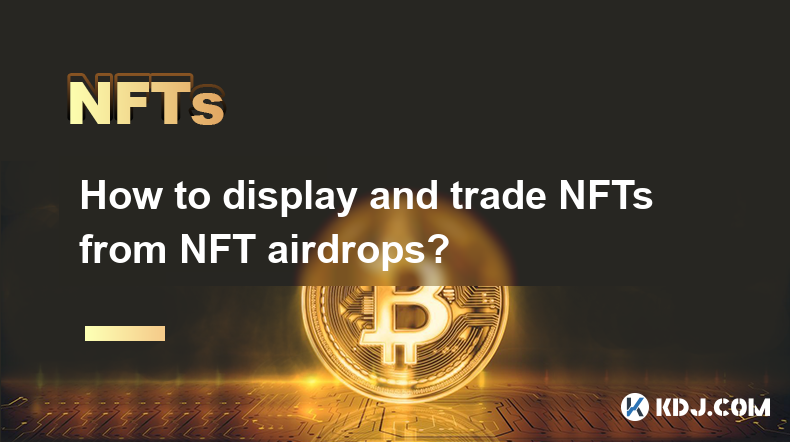
How to display and trade NFTs from NFT airdrops?
Apr 18,2025 at 04:42am
How to Display and Trade NFTs from NFT Airdrops? NFT airdrops have become a popular way for projects to distribute their tokens and engage with their community. If you've received NFTs through an airdrop, you might be wondering how to display and trade them. This article will guide you through the process step-by-step, ensuring you can showcase your NFT...
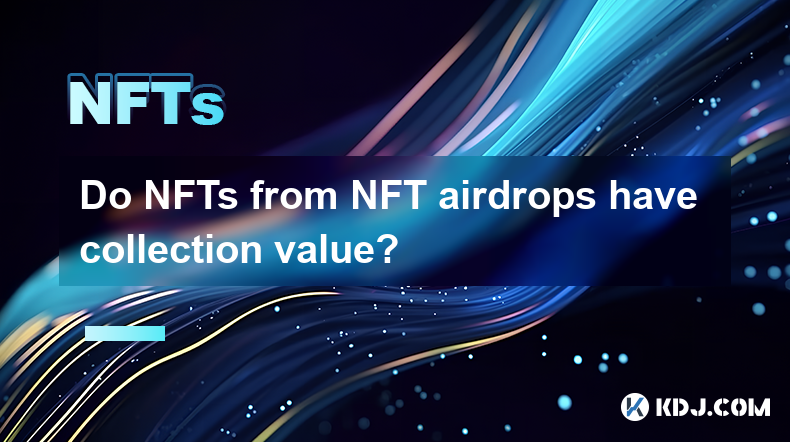
Do NFTs from NFT airdrops have collection value?
Apr 18,2025 at 11:49pm
NFTs, or non-fungible tokens, have become a significant part of the cryptocurrency ecosystem, and NFT airdrops are one way for projects to distribute these digital assets to their community. A common question that arises is whether NFTs received from airdrops have any collection value. To answer this question, we need to delve into various aspects of NF...
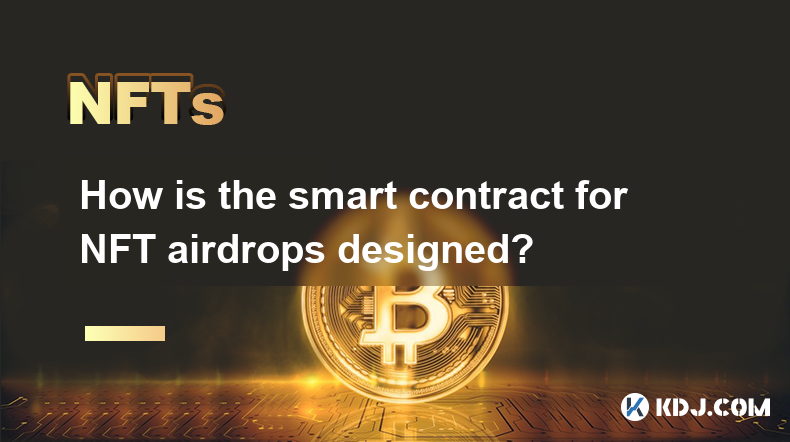
How is the smart contract for NFT airdrops designed?
Apr 18,2025 at 03:10am
The design of a smart contract for NFT airdrops is a complex process that requires careful consideration of various factors to ensure the airdrop is executed smoothly and securely. This article will delve into the intricacies of how such a smart contract is designed, focusing on key components, security measures, and the implementation process. Key Comp...
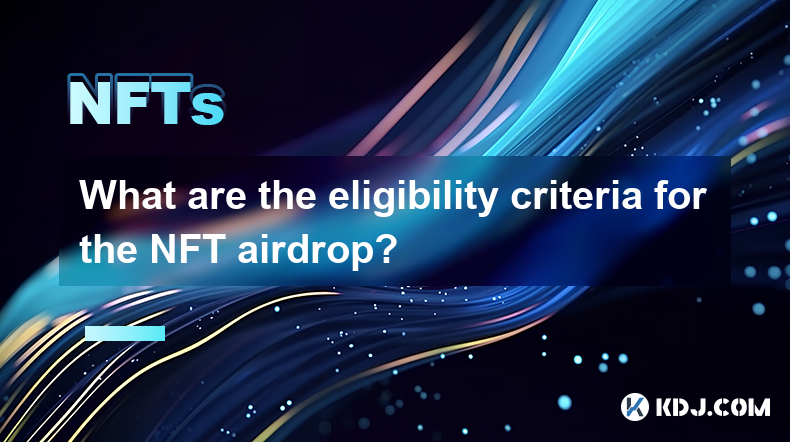
What are the eligibility criteria for the NFT airdrop?
Apr 17,2025 at 04:56pm
Understanding NFT AirdropsNFT airdrops are a popular method used by blockchain projects to distribute non-fungible tokens (NFTs) to their community members. These airdrops can serve various purposes, such as rewarding loyal users, promoting new projects, or increasing the visibility of existing ones. To participate in an NFT airdrop, individuals must me...

How to protect the copyright of artworks on NFT platforms?
Apr 19,2025 at 06:28am
The rise of Non-Fungible Tokens (NFTs) has revolutionized the way digital art is created, bought, and sold. As artists increasingly turn to NFT platforms to showcase and monetize their work, protecting the copyright of these artworks becomes a crucial concern. This article explores various strategies and tools that artists can use to safeguard their int...
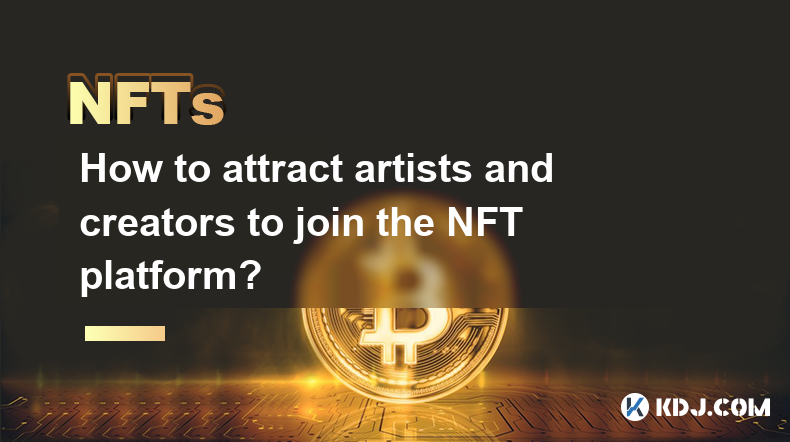
How to attract artists and creators to join the NFT platform?
Apr 18,2025 at 02:50pm
Attracting artists and creators to join an NFT platform is crucial for its success and growth. By understanding their needs and offering unique features, you can create a thriving community of digital artists and content creators. In this article, we will explore several strategies to entice artists and creators to join your NFT platform. Understanding ...

How to display and trade NFTs from NFT airdrops?
Apr 18,2025 at 04:42am
How to Display and Trade NFTs from NFT Airdrops? NFT airdrops have become a popular way for projects to distribute their tokens and engage with their community. If you've received NFTs through an airdrop, you might be wondering how to display and trade them. This article will guide you through the process step-by-step, ensuring you can showcase your NFT...

Do NFTs from NFT airdrops have collection value?
Apr 18,2025 at 11:49pm
NFTs, or non-fungible tokens, have become a significant part of the cryptocurrency ecosystem, and NFT airdrops are one way for projects to distribute these digital assets to their community. A common question that arises is whether NFTs received from airdrops have any collection value. To answer this question, we need to delve into various aspects of NF...

How is the smart contract for NFT airdrops designed?
Apr 18,2025 at 03:10am
The design of a smart contract for NFT airdrops is a complex process that requires careful consideration of various factors to ensure the airdrop is executed smoothly and securely. This article will delve into the intricacies of how such a smart contract is designed, focusing on key components, security measures, and the implementation process. Key Comp...

What are the eligibility criteria for the NFT airdrop?
Apr 17,2025 at 04:56pm
Understanding NFT AirdropsNFT airdrops are a popular method used by blockchain projects to distribute non-fungible tokens (NFTs) to their community members. These airdrops can serve various purposes, such as rewarding loyal users, promoting new projects, or increasing the visibility of existing ones. To participate in an NFT airdrop, individuals must me...

How to protect the copyright of artworks on NFT platforms?
Apr 19,2025 at 06:28am
The rise of Non-Fungible Tokens (NFTs) has revolutionized the way digital art is created, bought, and sold. As artists increasingly turn to NFT platforms to showcase and monetize their work, protecting the copyright of these artworks becomes a crucial concern. This article explores various strategies and tools that artists can use to safeguard their int...

How to attract artists and creators to join the NFT platform?
Apr 18,2025 at 02:50pm
Attracting artists and creators to join an NFT platform is crucial for its success and growth. By understanding their needs and offering unique features, you can create a thriving community of digital artists and content creators. In this article, we will explore several strategies to entice artists and creators to join your NFT platform. Understanding ...
See all articles
























































































